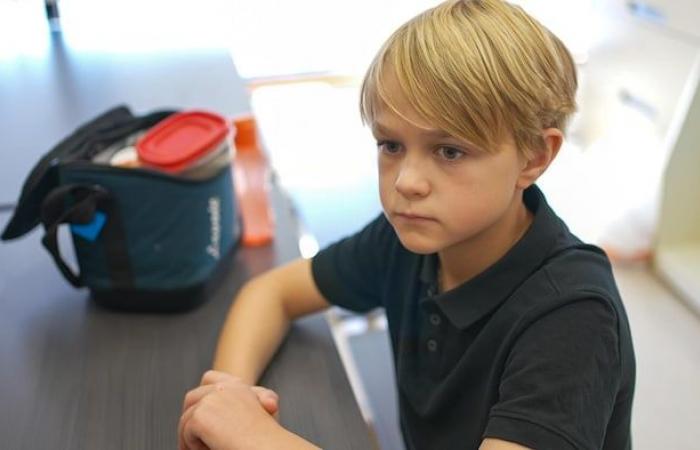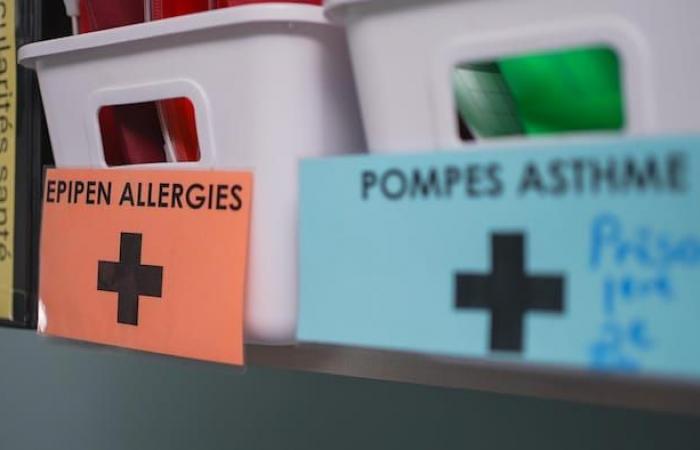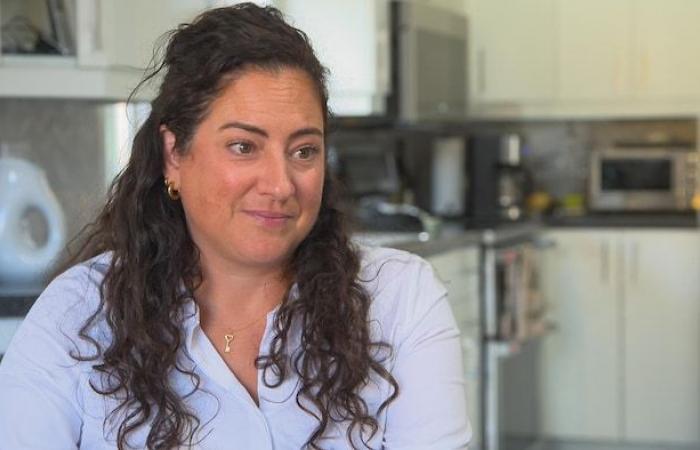In Ms. Johannie’s class, all foods are now allowed for snacks and in the lunch box. There is no longer any ban on allergens. Even for peanuts and tree nuts, which have been banned from the vast majority of Quebec schools for decades.
Raphaël, one of the students in this 6th grade class, suffers from serious allergies (peanuts, tree nuts and sesame), while his friend Olivier is allergic to eggs. This did not prevent the Gérard-Collin elementary school in Témiscouata-sur-le-Lac from turning to a new method of managing food allergies.
This major change, implemented at the start of the 2023-2024 school year in most primary schools in Bas-Saint-Laurent, goes completely against the grain of current practices (think of the recent case of this school in Longueuil).
However, this is a new way of doing things based on the most recent scientific data in the field of allergology.
Historically, banishment was recommended
recalls Dr. Philippe Bégin, head of the Allergy sector at CHU Sainte-Justine. But this approach has not proven itself.
We realized that there were still accidents in schools, then we said to ourselves, ultimately, it’s a bit of a false sense of security, continues the allergist. You think you’re not at risk, and ultimately you let your guards down, and then if there’s an accident, you might be less ready [à réagir].
Open in full screen mode
Raphaël, who is in grade 6 at Gérard-Collin elementary school, suffers from severe allergies to peanuts, tree nuts and sesame.
Photo: - / The grocery store
This shift, supported by the Public Health Department of the CISSS du Bas-Saint-Laurent, is inspired by the Guide to Good Practices for the Management of Food Allergies (New window) developed at the beginning of 2020 by the Montreal Public Health Department (DRSP) and Allergies Québec.
The protocol provides for systematic washing of hands and surfaces by school staff and students. Staff must also receive complete annual training, offered by the CISSS du Bas-Saint-Laurent, accompanied by role-playing, to know when and how to react in the event of an emergency.
It allows us to always be a little on the lookout. We know it could happen at any time. We are trained, we are confident in our training
explains teacher Johannie Roy. She also feels well prepared to administer the auto-injector, better known by its trade name EpiPen, if the situation requires it.
There’s a kind of lightening up to be had about that, she adds. […] It is certain that we are not comfortable in this type of situation, but we really have detailed protocols.
And according to the school’s principal, Jaimie Plourde, the approach is a success. The new measures have made it possible to establish a safer environment for allergic children, while making life easier for all parents, for whom managing the lunch box had become complex while trying to avoid allergens.
Open in full screen mode
In more than 75 schools in Bas-Saint-Laurent, staff receive annual training to know when and how to react in the event of an emergency.
Photo: - / The grocery store
We informed parents that we were no longer going to ban foods linked to allergies, and that we were going to put in place means to support our students so that things went well.
she explains.
If this turned out anxiety-provoking
For some parents of allergic children, school staff say they have been reassuring, working individually with families, which Raphaël’s mother, Julie Roy, confirms.
It doesn’t stress me out anymore, she confides. Zero risk doesn’t exist, so there sure was. [des allergènes]she blurted, referring to the old way of doing things. They still have everything they need here at school to respond to an emergency situation. […] and for administration of the auto-injector.
A false sense of security
In the medical community, a consensus has existed for several years that allergens should no longer be banned in schools, says Dr. Philippe Bégin. The approach implemented in Bas-Saint-Laurent schools should even be implemented everywhere, in his opinion, to replace the method of avoiding allergens which has not been tested.
In Quebec, nearly 75,000 students suffer from food allergies.
In theory, you can be allergic to anything, says Dr Bégin. Which means that even if we have a policy that avoids nuts and peanuts, I have patients who are fatally allergic to milk. We are not going to ban milk or eggs at school!
he says, recalling that around ten priority allergens cause the majority of food allergies.
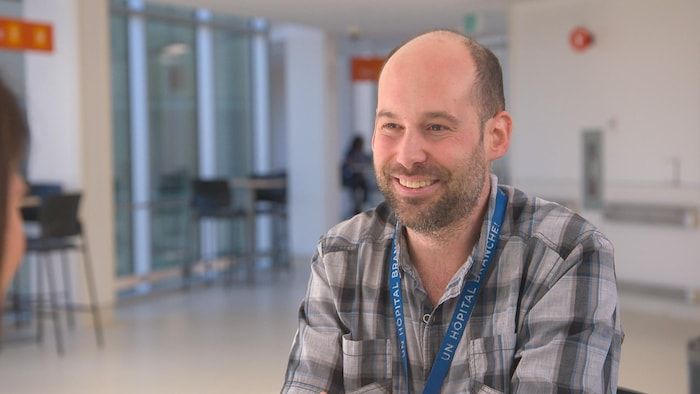
Open in full screen mode
Dr. Philippe Bégin, head of the Allergy sector at CHU Sainte-Justine, explains that banning allergens in schools has not proven effective.
Photo: - / The grocery store
To allow all foods to be brought into a school, however, it is necessary to ensure that an allergy management plan is put in place, including solid training for staff, who must learn how to administer the auto-injector.
This is a central point of a good plan for a school […] etc’is zero dangerous
says the head of the Allergy sector at CHU Sainte-Justine, who compares the dose of adrenaline contained in a dose to what a high school student secretes when he gives an oral communication.
There is really no stress in giving adrenaline. At worst, you’ll have given it away for nothing, then it doesn’t matter.
It is estimated that 20% of serious allergic reactions in children occur in schools, according to figures provided by Allergies Québec. Despite such data, the management of anaphylactic risk is variable in Quebec schools, according to Dr. Bégin, who deplores the situation, also giving the Allergies Quebec guide as a reference.
Allergies Québec denounces a legislative void
Feeling worried about sending your child to class, Dominique Seigneur knows what it’s like. She experienced it for years while her daughter Victoria, who has severe allergies to peanuts and sesame seeds, was in elementary school.
The mother often had to provide training to her daughter’s teachers herself.
There is no one who had [déjà] used an auto-injector or who really knew how to do the procedure. I had to show them
says the indignant woman who became director of communications at Allergies Québec.
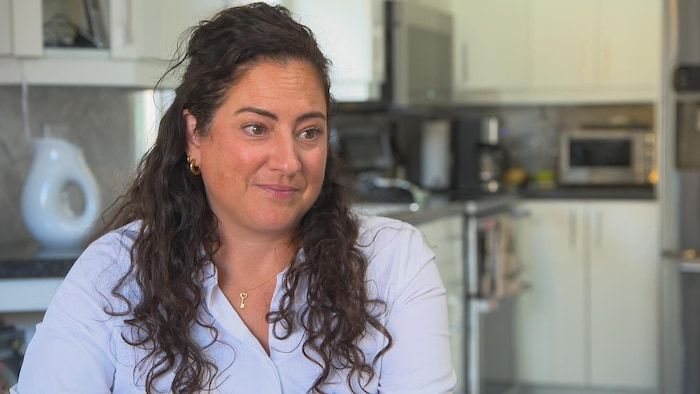
Open in full screen mode
Dominique Seigneur, director of communications at Allergies Québec
Photo: - / The grocery store
The organization has been taking action for more than 15 years to try to convince the Quebec government to adopt a policy to regulate the management of allergies in schools, like the majority of other Canadian provinces.
In Ontario, since 2006 they have loi Sabrina. It’s sad because this law was passed following the death of a little girl at school. […] I wonder what we are waiting for in Quebec!
Last September, Allergies Québec contacted the National Student Ombudsman in vain to try to get things moving. The organization was told that complaints had to be made individually, for one student at a time.
We have a legislative void and our young children are allergic, we fear for their safety
deplores Dominique Seigneur.
Quebec does not intend to standardize practices
The grocery store asked the Minister of Education, Bernard Drainville, what he planned to do in Quebec schools and what he thought of the initiative in force in Bas-Saint-Laurent. The interview request was declined, but a response was obtained by email.
The management of food allergies and snacks permitted for students is the responsibility of each school service center. They are best placed to establish choices and protocols according to their reality and also according to the agreements they have with each health establishment.

Open in full screen mode
Bernard Drainville, Minister of Education, at a press conference, Wednesday August 23, 2023.
Photo : - / Sylvain Roy Roussel
In his response, Bernard Drainville also mentions that the Quebec ministries of Education and Health and Social Services are developing a guide which will notably address the distribution and administration of medications in emergency situations, including allergies.
In fact, he reiterates what he said to The Canadian Press in spring 2023. We are continuing to work with Health to see how we can support schools in managing allergies.
we can read in the email.
While ministerial procrastination continues on the management of anaphylaxis in schools in Quebec, Dr. Philippe Bégin, on the ground, is sounding the alarm.
Currently, if there is an accident and then if we realize that there were no rules, whose fault is it? It’s no one’s fault because there is no obligation. What we would like is for everyone to adopt a clear plan. For parents, it would be a lot better if everyone did the same thing.
Dominique Seigneur, who represents thousands of parents at Allergies Québec, shares the same fear: I’m really afraid that something as tragic will happen as in Ontario. I will never accept that there is someone who gives their life for the Ministries of Education and Health to take action.


